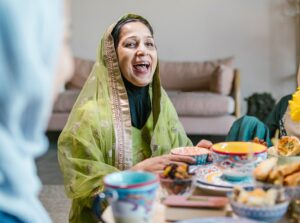Time: 10:00 - 12:30
Venue: Zoom meeting
Join us for an interactive exploration of the potential role of faith communities in promoting healthier, more equitable and sustainable food systems.

During lockdown, faith communities offered a rallying point for communities, many establishing community kitchens and feeding schemes. Faith communities have access to significant tracts of land which could be cultivated by micro-farmers. Faith-based organisations have large constituencies which often include politicians and officials. Moreover, South African faith communities have played key roles in mobilising people toward social and political change during colonialism and apartheid.
This suggests that faith communities could play important roles in food governance, raising awareness and promoting change at multiple levels, including the local parish, organisation-wide, and inter-faith.
Religion and spirituality shape core values of what we hold dear and sacred. Food features centrally in many religious ceremonies and celebrations, serving to build a sense of community while conveying deep symbolic meaning. For most faith communities, love and compassion are key values which have strong implications for food governance issues such as malnutrition (well-being), economic participation (justice), and environmental sustainability (stewardship of creation).
Join us for an interactive exploration of the potential role of faith communities in promoting healthier, more equitable and sustainable food systems.
Key questions:
- How do common values commit faith communities to action on malnutrition, especially among children?
- What do these values imply for a just transition to sustainable and resilient food systems?
- What role could faith communities play in transforming food systems so that they ensure adequate nutrition and environmental sustainability?
- Is there a road map towards mobilising faith communities to play a stronger, more coherent role in food governance?
Join our next Community of Practice (CoP) gathering, in which we explore how some of these questions affect our pursuit of democratic, just, and sustainable local food systems governance in South Africa.
Presenters:
Professor Ernst Conradie (University of the Western Cape’s Department of Religion and Theology)
Francesca de Gasparis (Southern African Faith Communities’ Environment Institute)
Panelists:
Zukile Ngqeza (Lecturer in the Faculty of Theology at North-West University)
Cassiem Khan (Executive director, Imam Haron Foundation)
Facilitator: Robert Kriger
Please register here for the meeting and to receive a Zoom link.
Click here to add the event to your Google calendar.
You can access documents from previous CoP meetings using this link.
PS: Following the great increase in interest and broader participation in the online meetings of this network, and inspired by a series of conversations convened jointly with the FAO and the EC, we are re-branding these events as “Food Imbizos”. We will be publishing more information about our events on a dedicated website soon – watch this space!
(Photo: RODNAE Productions / Pexels)
Upcoming Events
Our GOALS
We recognise that producers, processors, distributors and consumers are incorporated into the food system under varying terms and returns. We also recognise the economic, social, human and environmental health impacts associated with food security. Therefore our goal is to conduct research, build capacity and disseminate findings that will promote a sustainable food system in South Africa.
Our MISSION
Our research is concerned with the scale, nature, causes and consequences of food insecurity in South Africa and elsewhere on the African continent. Thus our mission is to investigate products, technologies, processes and policies that can reduce food insecurity and mitigate its negative outcomes. We seek to make a difference to food security by linking innovative science with critical enquiry.



